Best Satellite Internet Providers of 2026
While many people are flocking to Starlink, Viasat remains our favorite all-around satellite ISP for its unlimited data, no-contract option, and top-tier customer service.
For many people in rural areas, satellite internet is the only choice. However, picking the right satellite internet provider can be the difference between getting the speed you need and being stuck with a bill you cannot afford. So, we researched every satellite internet provider in the United States and put together the following to help you choose the right one for you based on availability, speed, value, reliability, and reputation.
BroadbandNow Bottom Line
If you’re looking for the best overall satellite internet provider with options for unlimited data, no contracts, and speeds up to 150 Mbps, you cannot beat Viasat. With a longstanding history of exceptional customer service, Viasat delivers a satisfying satellite internet experience. Check out the latest Viasat internet deals to find the plan that matches your home’s needs.
Navigating the Best Satellite Internet Providers
- Viasat (BroadbandNow Top Pick)
- Starlink (Next-Best Satellite ISP)
- Hughesnet (Budget Pick)
- Our Top Satellite ISP Recommendations
- Why You Should Purchase Satellite Internet
- How We Chose Our Favorite Satellite Internet Providers
- Methodology for Assessing Internet Providers
- Other Rural Internet Providers Worth Mentioning
- Tips for Picking the Perfect Satellite Internet Provider
- Frequently Asked Questions About Satellite Internet Providers
Viasat (BroadbandNow Top Pick)
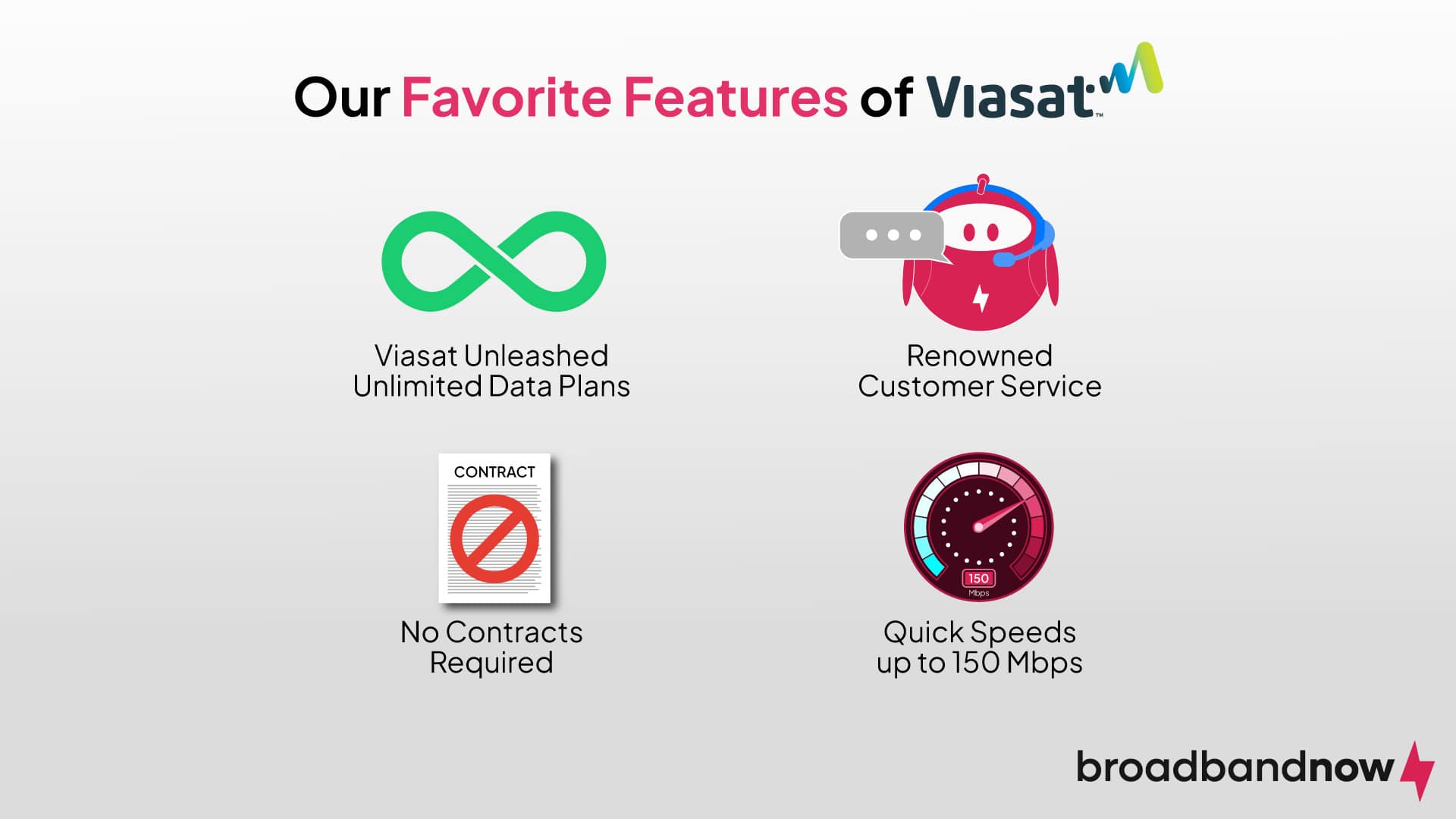
Simply put: The name Viasat is synonymous with satellite internet. As a groundbreaking and long-established satellite internet provider with comprehensive mainland U.S. coverage (sorry, Alaska and Hawaii), Viasat is our top satellite internet provider pick; this is because of its plan offerings, quick internet speeds, and unparalleled customer support in the space (no pun intended). With its recent introduction of Viasat Unleashed, Viasat combines unlimited data, no contracts, and speeds up to 150 Mbps into an attractive package starting at $39.99 per month; other satellite internet providers like Hughesnet cannot match this directly.
While it still has higher equipment fees, some connectivity issues, and a time-consuming professional installation of the satellite internet, Viasat is blasting off in a new direction by shedding soft data caps and expensive early termination fees (ETFs). Out of thousands of customer reviews, Viasat received the highest ratings for customer service of any satellite internet provider, showing its commitment to resolving customer issues. Jim Moffit mentioned in his review of Viasat that he received “excellent customer service each time” he called, while Evan Roper said, “Viasat is the ONLY company to go with when you want results.” If you’re looking for a satellite ISP that provides immense value, doesn’t lock you into a contract, and has a dedicated support staff, you cannot go wrong with Viasat.
What We Like
- Unlimited data with Viasat Unleashed plans
- Exceptional customer service
- No contract requirement
What We Don't Like
- Higher latencies
- Costly dish lease or rental fees
Starlink (Next-Best Satellite ISP)
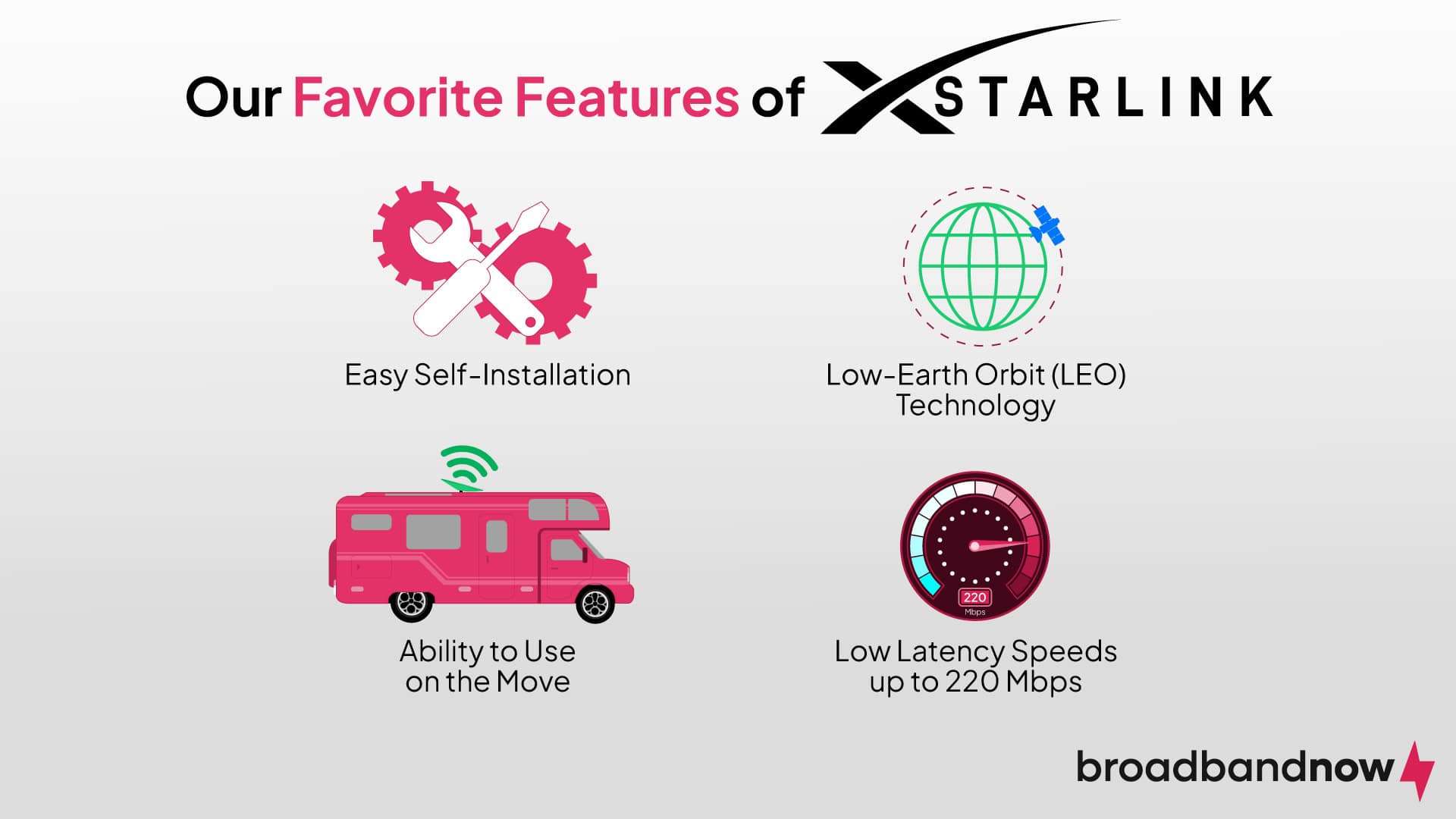
Unlike its traditional satellite internet counterparts at Viasat and Hughesnet, Starlink’s Low-Earth Orbit (LEO) satellites generate a high-performance service that leaves older satellite ISPs stargazing. With speeds up to 400 Mbps, global connectivity, and latencies as low as 5 ms, Starlink satellite internet delivers enough speed to engage in streaming, gaming, and many of the activities homes are accustomed to on a wired connection. As a bonus, Starlink customers can even move their service from place to place using Starlink Roam, a capability that requires you to jump through many more hoops with other satellite internet providers. Avi, our Head of Partnerships, even has Starlink for Boats, and she said, “The simplicity of its setup (plug and go) and the service is absolutely amazing!”
However, all that innovation comes at a price, as Starlink plans start at $50 per month, not to mention the initial equipment fee is as high as $599 for Residential and Roam customers. While we love that Starlink allows customers to forgo expensive professional installations and set up their uplink terminals at home through an app, we were less than impressed with Starlink’s customer service process; they encourage you to use the app for any technical issues. If you want the latest and greatest in satellite technology, and you’re willing to deal with any technical problems yourself, then Starlink could be right for you.
What We Like
- Fastest satellite internet speeds
- Low latencies due to LEO technology
- Easy self-installation process
What We Don't Like
- Lack of traditional customer support
- Spotty coverage in random areas
- Expensive upfront equipment costs
Hughesnet (Budget Pick)
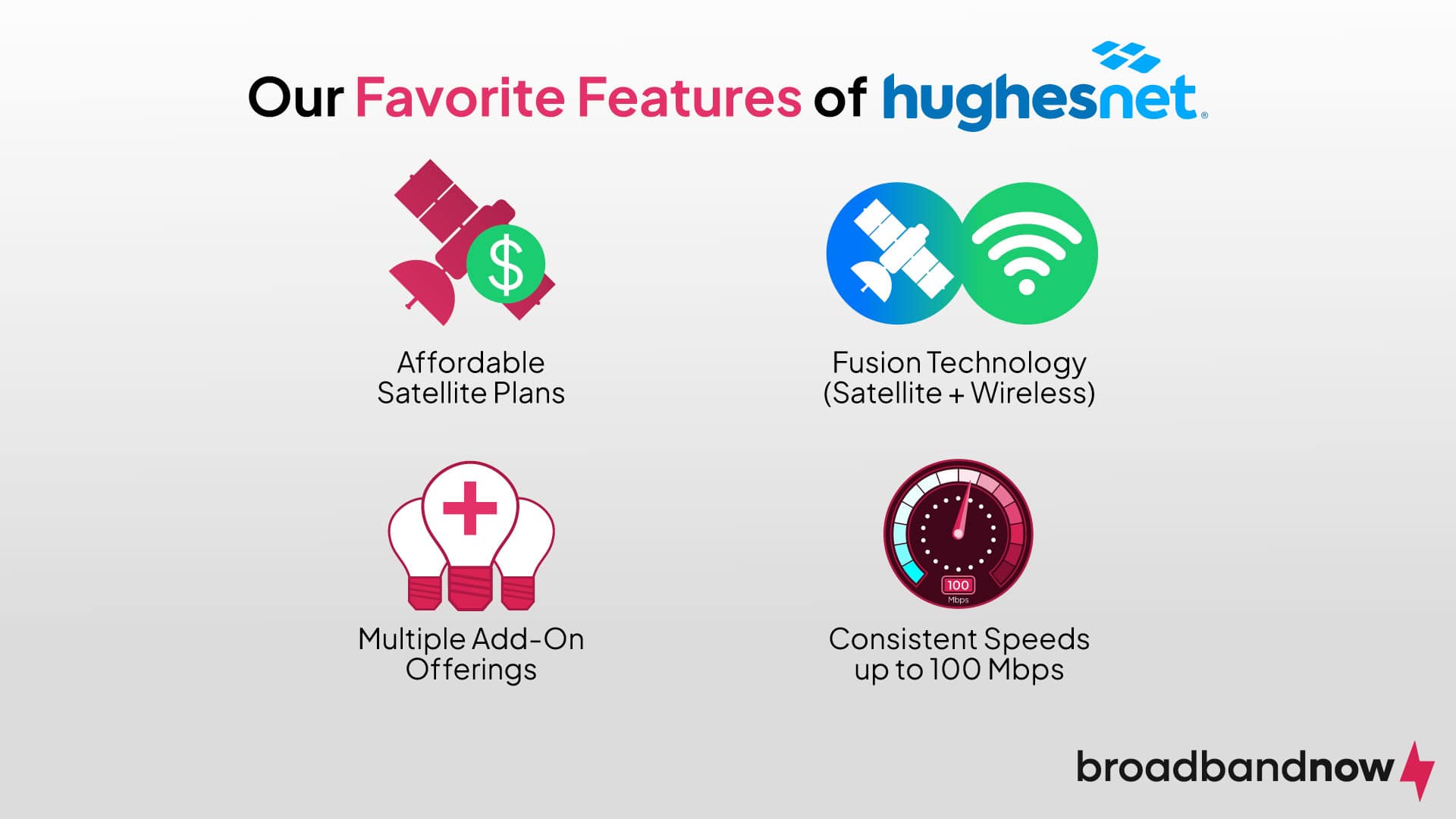
Hughesnet isn’t sitting idly by in the shade while Viasat and Starlink take all the starlight. Instead, Hughesnet provides customers with affordable plan options, comprehensive coverage (across all 50 states and territories), and innovative Fusion technology. As the cheapest satellite internet provider option, Hughesnet plans start at just $39.99 per month, meaning you can get satellite internet on a budget (unlike with Starlink). In an effort to stay relevant in the internet space race, Hughesnet’s newest Fusion satellite internet plans combine wireless and satellite connections to deliver low-latency and consistent speeds up to 100 Mbps.
Hughesnet does have some downsides, though; these include required 24-month contracts (with ETFs), no unlimited data cap option (soft data caps on each plan), required technician installation (rarely free), and stiff equipment fees (similar to Viasat). Even with all that, when we dove into our database of hands-on customer reviews about Hughesnet, we discovered Hughesnet goes the extra mile to provide help across its history of being a reliable service for rural customers. Martha Miller remarked that “the costs were comparable” to what she “paid for a landline with horrid access,” while Rick Koon said his Hughesnet technician “went above the standard customer service help.” Overall, we found Hughesnet to be an affordable and dependable satellite internet provider that many people in rural areas will find suitable and reasonable for their budget.
What We Like
- Affordable plan options
- Comprehensive availability
- Consistent service with Fusion plans
What We Don't Like
- Restrictive soft data caps
- Mediocre satellite speeds
- Pricey equipment fees
Our Top Satellite ISP Recommendations
| Details | BroadbandNow Top Pick | Next-Best Satellite ISP | Best for Budget Buyers |
|---|---|---|---|
| Provider name | Viasat | Starlink | Hughesnet |
| Starting price | $39.99 per month | $50 per month | $39.99 per month |
| Download speeds (up to) | 150 Mbps | 400 Mbps | 100 Mbps |
| Equipment fee | $15 per month ($299 dish lifetime lease) | $599 (plus $50 shipping and handling) | $14.99 per month ($299.99 dish purchase) for satellite plans |
| Installation fee | $99 | N/A | $99 |
| Data caps | 65 GB to Unlimited | Unlimited (1 TB of Priority access) | Unlimited (15-200 GB soft data cap) |
| Contracts | Optional | No | Required (24-month contract) |
| Bundle options | VOIP phone | N/A | VOIP phone or security software |
| More info | View Viasat Deals | View Starlink Deals | View Hughesnet Deals |
Why Satellite Internet Could Be Right for You
Not sure if satellite internet is right for your home? Follow these scenarios to see if satellite internet matches your current situation:
- You live in a rural or remote area. Despite efforts on behalf of the government and internet providers to expand fiber and other wired internet connections, millions of people across the U.S. still don’t have internet access exceeding 100 Mbps. If you live in one of these areas, satellite internet can be crucial for your home to access the speeds you need for remote work, entertainment, and daily activities. Whether you live on a ranch 50 miles from the next household or a tropical island with only a handful of residents, satellite internet can give you the speed and access that other internet connection types lack in rural areas.
- You want internet service on the move. Today, people want the flexibility to move around and work wherever they please. Whether this situation means traveling around in an RV, living in a tiny house, or simply living off-grid in a remote location, satellite internet providers allow you to move your internet service without signing up for a new ISP every time you move. Of course, satellite internet providers have different prices and policies for moving your service, so you’ll need to research those options beforehand.
- Your area is prone to adverse weather or natural disasters. Unlike 5G home internet and fixed wireless, satellite internet can still function during poor weather conditions or other natural occurrences beyond your control. If you live in one of these areas where these conditions are prevalent, satellite internet could be the key to keeping you connected, especially if an emergency arises.
How We Chose Our Favorite Satellite Internet Providers
Even though the current market for satellite internet providers essentially boils down to the Big Three (Viasat, Hughesnet, and Starlink), this scenario won’t always be the case. New emerging satellite ISPs like Amazon’s Project Kuiper and Eutelsat OneWeb are rapidly growing, while smaller satellite services offer regional competition. We used these key factors to choose our top picks:
- Availability: As one of the most important factors when choosing an ISP, we consider each internet provider’s potential ability to provide coverage at your location. Internet providers covering large segments of the U.S. are more favorable than those who only offer services in select states or regions. While availability is more of a factor for terrestrial internet providers, most satellite ISPs have comprehensive national coverage and some global coverage. Therefore, we considered your ability to move your satellite service or use it on the go as an additional perk for this list.
- Speed: How fast your internet goes is essential to how well it can serve your household’s activities and devices. For this reason, we only considered satellite internet providers that offer plans exceeding the FCC’s new definition of broadband (100 Mbps download / 20 Mbps upload). Additionally, we looked into the latencies of each satellite internet provider and showed a preference for those with quicker millisecond response times due to technological advancements.
- Value: Internet is a household necessity that many argue is a utility, like water or electricity. Therefore, internet providers need to deliver quick speeds at a reasonable price. When looking at satellite internet providers, we looked for affordable options ranging from $50 to $120 per month. Moreover, we preferred satellite internet providers with more flexible contracts and fewer data cap penalties.
- Reliability: An internet provider is only as good as its ability to provide consistent service during all hours of the day. For this list, we looked at the reliability of these internet providers by leaning on historical outage report data. We favored satellite internet providers with a proven track record of quality service.
- Reputation: Whenever you encounter an issue with your satellite internet provider, you want a company that responds quickly and pleasantly. We chose our favorite satellite ISPs by looking for companies with positive customer reviews and a history of commendable customer service tactics.
Methodology for Assessing Internet Providers
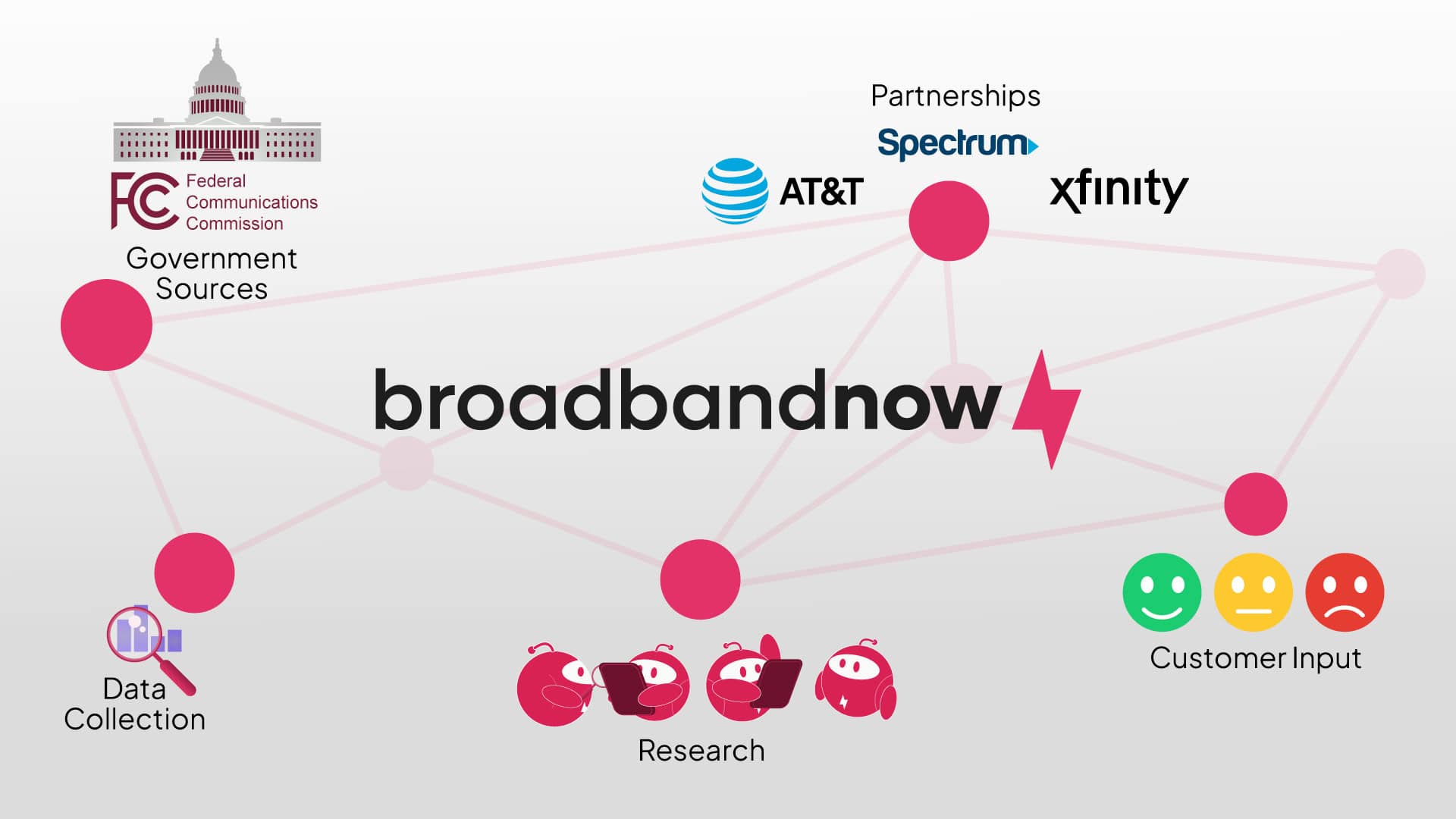
For us, nothing compares to hands-on experience with an internet provider. From installation to customer service and everything in between, it’s the only way to gather the key insights you need to assess internet providers objectively. That’s why we tested all the major internet providers in the U.S. (as well as many smaller ISPs). We wanted to give you the direct feedback you need to make the best decision, no matter where you live or what internet providers are available at your address. However, we didn’t stop there.
Beyond our firsthand experience with internet providers, we leveraged data from several sources to rank these services. We analyzed reports and research from the Federal Communications Commission (FCC), as well as utilized the FCC’s Broadband Data Collection to source intricate information about ISPs. We worked directly with internet providers to get the latest plans, pricing, promotions, and availability. Our dedicated data collection team found fees, price hikes, and other details, while BroadbandNow Research investigated ISP claims, generated custom reports, and partnered with major broadband entities like Microsoft and the NTIA to remark on the state of broadband. Lastly, we looked to services like the American Customer Satisfaction Index (ACSI), J.D. Power, and the Better Business Bureau (BBB), in combination with user reviews sent to us directly, to get customer feedback on internet provider activities.
In short, we know internet providers inside and out. When we make recommendations, we’re saying these ISPs surpass all others in terms of quality, service, and support. As a result, you can trust these internet providers to fulfill the necessities of your family and household.
Other Rural Internet Providers Worth Mentioning
While the options above are our favorite satellite internet providers, they aren’t your only options if you live in a rural area and need the internet. Fixed wireless and 5G home internet are great alternatives in these areas that offer different price points, data caps, and contractual requirements. Here are some top rural internet providers:
- T-Mobile 5G Home Internet: T-Mobile 5G Home Internet is taking a bite out of many internet markets for good reason. With nearly universal access across the country, customers enjoy T-Mobile’s service for its $60 per month (with AutoPay), numerous sign-up promotions, and speeds between 72 Mbps and 245 Mbps. That said, 5G home internet is still developing, and some people have reported less-than-optimal experiences with buffering and speed fluctuations with this technology.
- Rise Broadband: Offering traditional fixed wireless service in 18 states, Rise Broadband offers unlimited data and quick speeds up to 300 Mbps with prices starting at $25 per month (with AutoPay). Even with these features, if you don’t have a clear line of sight (LOS) to your location, your speeds could be much lower than advertised.
- AT&T Internet Air: AT&T traditionally offered DSL and fixed wireless connections to rural areas; however, AT&T Internet Air is now AT&T’s 5G home internet option that many people across the U.S. are adopting. As a newcomer to this space, AT&T Internet Air only achieves speeds between 40-140 Mbps, lagging behind its T-Mobile and Verizon counterparts; however, at just $34 per month with no contract, it still provides a significant upgrade to locations without other high-speed internet options.
- Verizon 5G Home Internet: Although it’s one of the more expensive 5G home internet options on the market, Verizon 5G Home Internet delivers top-tier speeds up to 300 Mbps to areas without significant fiber or cable internet offerings. Verizon is also well-known for its exceptional promotions and the ability to get discounts on your service by bundling a mobile phone line. Even so, Verizon 5G Home Internet still needs to expand to more areas before it can be a top rural contender for internet services.
- EarthLink: Most people might not be aware of this, but did you know that EarthLink also has home wireless internet plans? With speeds up to 425 Mbps, EarthLink’s home wireless plans offer 4G LTE and 5G connections to rural areas for as little as $59.95 per month. However, you’ll have to choose either a data cap between 100 GB and 300 GB per month or pay a premium for unlimited data; this diminishes the overall value you’ll get from this service.
Tips for Picking the Perfect Satellite Internet Provider
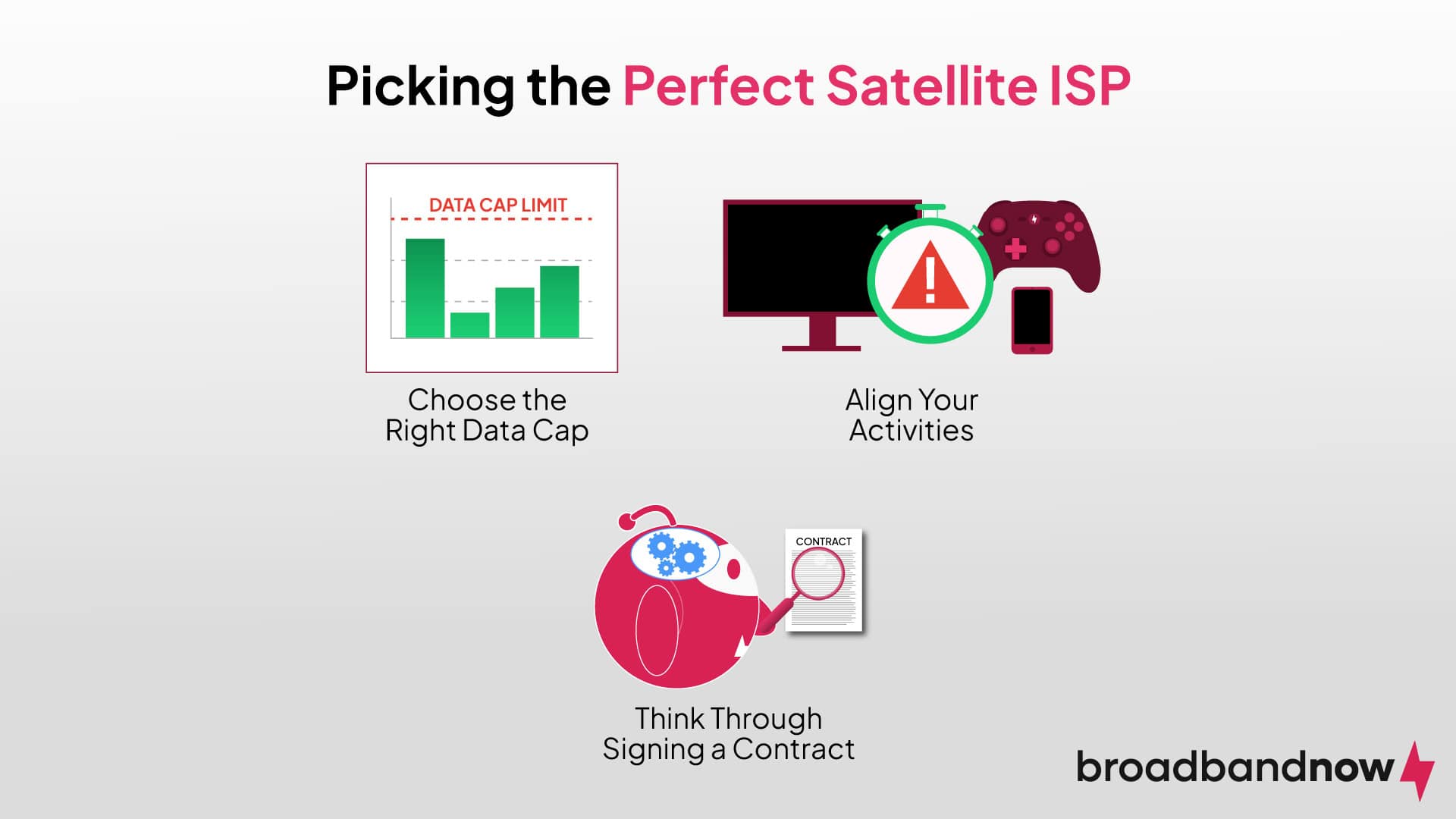
Satellite internet allows customers to live a flexible lifestyle, but there are some trade-offs that can creep up on you. Before you subscribe to any satellite internet provider, consider the following tips:
- Choose the right data cap. The differentiator between major satellite internet plans is not exactly the speeds they offer (though that is important), but the accompanying data cap they have. Before signing up for any plan, review your last internet bill to see how many GB of data you used throughout an average billing cycle. That way, you can pick a plan that aligns with what you’ll truly use.
- Align your activities. Whether it’s giving up streaming constantly or changing your gaming habits for games that aren’t based on quick reactions, you may need to change your internet habits on satellite internet. While satellite internet is getting faster and LEO satellite internet is introducing lower latencies, you’ll still need to be conscious of your activities and adjust them accordingly to your new connection.
- Think through signing a contract. Before you sign a two-year contract with a satellite internet provider, think about where you might be in the next couple of years. If you plan on still being in a location that requires satellite internet, signing a contract may make sense in the long run. However, if you’re unsure, you might want to pay the upfront costs to get service without a contract so you don’t get stuck with an ETF.
Frequently Asked Questions About Satellite Internet Providers
Which internet provider offers the best satellite internet plan?
Viasat is the best satellite internet provider because of its unlimited data plans, quick satellite internet speeds, and renowned customer service history. While satellite ISPs like Starlink offer faster speeds, Viasat still stands out as the frontrunner for satellite internet service in most rural areas of the country.
What kinds of speeds can you get with satellite internet?
Satellite internet speeds typically range from 25 Mbps to 220 Mbps. However, most satellite internet providers come with a soft data cap, which means that once you hit that limit, your service may be throttled or significantly slowed down. This means that your advertised speeds can change substantially if you exceed your allotted data.
Can you stream Netflix and Hulu using satellite internet?
Netflix and Hulu require a minimum of 5 Mbps and 3 Mbps, respectively, to stream. If you want 4K video quality, you’ll need at least 15 Mbps speeds. Most satellite internet plans have minimum speeds of 25 Mbps, so streaming with satellite internet shouldn’t be a problem. The more significant consideration is the amount of data you’ll use by streaming over time if you have a data cap.
Is satellite internet better or worse than 5G home internet?
Satellite internet provides more consistent service than 5G home internet; however, 5G home internet providers tend to offer faster speeds, more promotions, and lower latencies. Moreover, not all 5G home internet providers have reached the most remote areas of the country, making satellite internet a staple in many rural communities.
How does satellite internet work?
Satellite internet works by utilizing GEO satellites in orbit. They receive data from users through their ISP’s offices and beam information back to them through reception dishes at their residences. Due to the physical space between an internet user and satellites that are over 22,000 miles away, there can be significant delays associated with various activities. However, the technology ensures that anyone living in the orbit of a satellite can access the internet.
In comparison, LEO satellites, such as the ones utilized by Starlink, orbit the Earth at a much closer distance than GEO satellites. This lower altitude means these satellites can be smaller, cheaper, and easier to launch into space. With the shorter distance, LEO satellite internet providers can transmit faster internet speeds at lower latencies than traditional satellite ISPs.


